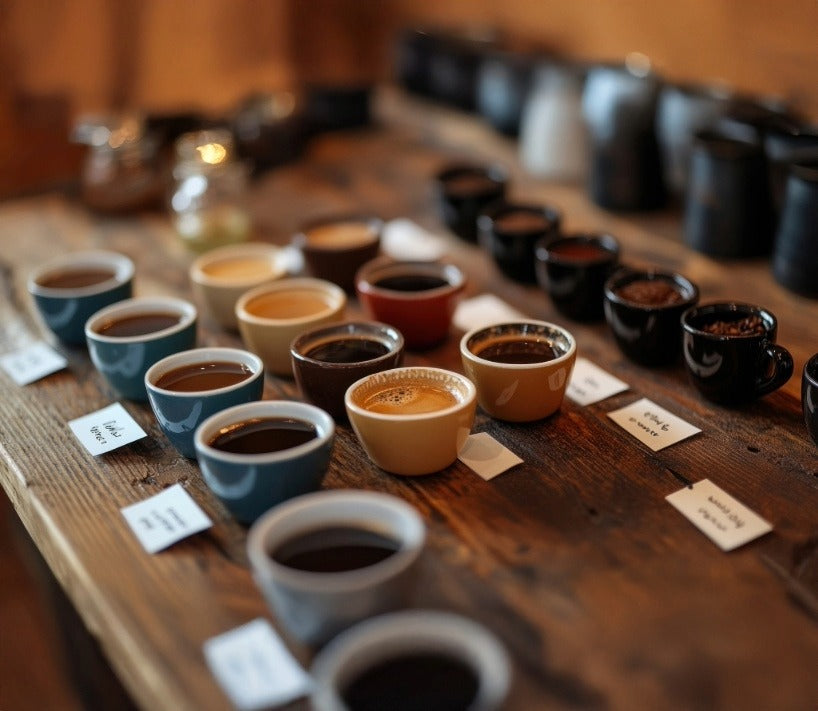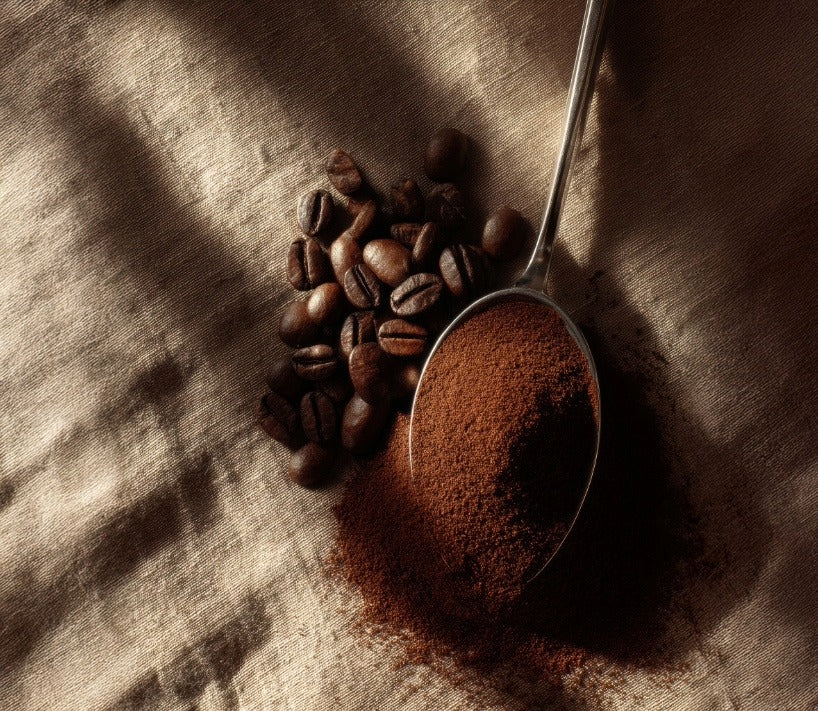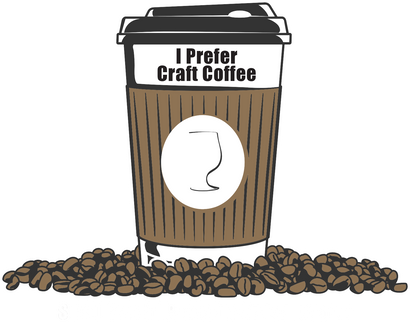The Bean Bungle: Why So Many Baristas Don’t Actually Know Their Coffee
April 16, 2025 10 min read
The Bean Bungle: Why So Many Baristas Don’t Actually Know Their Coffee (And How You Can Step Up Your Java Game)
I vividly remember the day I realized that not all baristas are passionate coffee experts. I was in a popular coffee shop chain—where the pastries looked Instagram-ready, the music was trendy, and the décor was perfectly curated to make me feel hipper than I actually am. I ordered a fancy-sounding single-origin pour-over that promised tasting notes of raspberry, dark chocolate, and “subtle hints of rose petal.” Romantic, right?
Then came the disappointment. When I asked the barista where the beans were sourced from or what the roast date was, I was met with a blank stare. She politely mumbled something about “Central America,” but she looked about as clueless as I felt. In that moment, it dawned on me: Most baristas out there might not actually know much about the very coffee they’re brewing and serving.
If you’ve ever wondered why that is—or if you’ve noticed an alarming lack of coffee know-how from the people who literally handle your morning elixir—pull up a chair, grab yourself a mug of something delicious, and let’s spill the beans together.
1. The Reality of High Employee Turnover
One of the most glaring reasons many baristas don’t know a whole lot about the coffee they’re serving is that coffee shops, especially chain establishments, tend to have a revolving door of employees. It’s not uncommon for staff members to move on within a few months, whether it’s because they’re in school, juggling multiple gigs, or simply discovering that the world of steamed milk and espresso shots isn’t their lifelong calling.
-
Short training periods: With so many staff changes, coffee shops often don’t invest the time or money into comprehensive, in-depth coffee education programs. You might expect your barista to be your go-to coffee guru, but the reality is that many get just enough training to work the espresso machine and perform basic latte art (if at all).
-
Limited brand incentives: If a company doesn’t have a strong emphasis on specialty coffee knowledge—highlighting roast profiles, bean origins, and tasting notes—baristas have little motivation to become coffee experts. It’s not that they don’t care; rather, there’s just no push from management to dig deeper.
2. The Commodity Coffee Mindset
We live in a world where coffee is often viewed as a quick pick-me-up rather than an artisanal product. Grab and go. Get it done. Slap some sugar on it if it tastes bad. This mentality can trickle down to the baristas themselves. If the shop they’re working in treats coffee like a fast-moving commodity—akin to a basic necessity like milk or bread—then there’s little opportunity or desire to deep-dive into the specifics of each bean.
-
Minimal exposure to specialty coffee: Some coffee shops focus on cheaper, more generic beans. When you’re not dealing with carefully curated and expertly roasted beans, the nuances matter less. After all, a huge tub of medium-roast coffee from an unknown origin doesn’t exactly scream “study my origin story!”
-
Marketing vs. Education: Some chains are big on marketing but lean on superficial talking points like “bold flavor,” “smooth finish,” or the occasional single-origin buzzword. Without genuine educational resources, baristas end up parroting ambiguous descriptions instead of delivering real insights into the best small batch coffee or discussing why certain roasts might be a good coffee to drink black.
3. Overworked and Underpaid
Baristas often work in high-paced environments, juggling multiple orders, customizations, and the occasional impatient customer who’s late for a meeting. With time constraints and basic pay scales, they might not find it feasible to commit extra mental bandwidth to coffee knowledge—even if they want to. For instance, mastering latte art can be physically time-consuming, but it’s also visually appealing for customers. Learning about coffee origins and roast dates, on the other hand, doesn’t show instant, flashy results. It’s more about long-term appreciation and subtle flavor recognition.
-
Focus on speed vs. expertise: Many coffee shops prioritize quick service over thorough coffee education. That focus on efficiency means staff might just rely on a few automated machines, leading to a “push-button, get-coffee” approach. Even if you’re curious about best coffee online or buy specialty coffee online, you won’t find much help from someone whose primary objective is to keep the line moving.
-
No formal barista certifications: There are specialty coffee certifications out there (SCA barista courses, for instance), but most shops won’t pay for that extra training, nor do they require it. That leaves a lot of baristas in the dark about what truly makes coffee “specialty” in the first place.
4. Inconsistent or Nonexistent Training Programs
If you have 50 employees cycling in and out of a coffee shop, it’s difficult to standardize a thorough barista training program. Some places have a quick orientation video or a manual that covers coffee basics, but rarely does it delve into the complexities of coffee terroir, processing methods, or the differences between the best tasting whole bean coffee and a standard run-of-the-mill roast.
-
Skimming the surface: Many training guides revolve around operational tasks (like how to calibrate the espresso machine or how to steam milk). Deep knowledge—like the difference between best specialty coffee online vs. commodity blends—doesn’t get the spotlight.
-
Lack of coffee “mentors”: In a perfect world, each new barista would be mentored by someone with a passion for coffee. That rarely happens in high-turnover environments. Even if there is one coffee-obsessed employee who knows the bean’s backstory, that knowledge might not spread effectively if they leave or if the leadership doesn’t emphasize passing it on.
5. The Gap Between Shop Owners and Staff
Consider a scenario: A coffee shop might be owned by a passionate coffee lover who invests in excellent equipment and has a curated selection of beans—even best espresso beans or single-origin treasures. But if the owner doesn’t spend time on the floor, or invests in staff training, the baristas remain disconnected from that passion.
-
Disconnect in knowledge transfer: The owner might know all about how to source from the best small batch coffee roasters, but the staff never hears the story. If customers ask, “Hey, is this coffee from Ethiopia or Colombia?” they might just get a shrug.
-
No consistent culture of education: For a barista to care deeply about coffee, they have to feel that excitement from leadership. If the culture values speed or upselling pastries over discussing coffee origins, guess which priority wins?
6. Specialty Coffee Is a Niche
Even though we see “specialty coffee” popping up everywhere—like specialty coffee near me signs or fancy-sounding single-origin labels—the segment of truly high-quality beans is still relatively small. The broader market still runs on commodity coffee. As a result, baristas in mainstream shops might go their entire careers without handling exceptional beans or even hearing about terms like “cupping notes,” “processing methods,” or “cooperative farm sourcing.”
-
The intimidation factor: Specialty coffee can be intimidating. There’s a whole lexicon (acidity, body, mouthfeel, terroir) that can scare people off. If the baristas don’t have a mentor or a user-friendly resource, they might decide it’s easier not to delve into that realm at all.
-
Misconceptions about what customers want: Some coffee shop owners or managers think customers only care about quick service and a decent taste. They might not realize there’s a growing audience of coffee enthusiasts who do want to know more. When you’re ignoring those coffee nerds (like me!) who ask for the exact bean origin, you miss an opportunity to elevate the experience.
7. The Personal Passion Factor
Let’s face it: coffee is a passion-driven industry. Some baristas genuinely love coffee, dedicating their free time to learning about it, experimenting with new brewing methods, or ordering the best craft coffee online to compare roasts. Others see the job as purely a means to pay the bills or fill a summer break. And that’s totally fine—we all have our own callings.
-
Why some baristas are super knowledgeable: You might stumble across a barista who knows everything from the origin story of the bean to the farmer’s name. These folks often took it upon themselves to learn, possibly sampling the best espresso beans or searching the marketplace for the top coffee delivered from a far-flung roaster. They’re the exception, not the rule, which is why you’ll see a stark difference in service quality.
-
Inconsistent passion, inconsistent results: Unless the coffee shop fosters a love of coffee (through training, tastings, or even staff competitions), a barista’s knowledge might just be limited to what’s necessary to make drinks quickly. It’s nothing personal—it’s just the nature of many service jobs.
8. Cultural Perceptions and Price Sensitivity
There’s also a cultural side to this. Coffee cultures vary across regions, with some places valuing the social aspect of coffee shops more than the artisan aspect. If the local clientele mostly orders syrup-laden lattes and pays little mind to the beans themselves, the baristas might never get questions about origin or freshness. Without consumer demand for details, there’s no strong reason to learn them.
-
Hard to justify premium prices: Specialty beans, like the ones you might find if you buy specialty coffee online, often cost more than standard blends. If a coffee shop is catering to budget-conscious customers, they might not carry those pricy beans—or train baristas on them. As a result, you’re unlikely to see baristas proudly talking up the difference between a natural-processed Ethiopian bean and a washed Colombian when the main priority is cheap, fast, and sweet.
-
Consumer education loop: Interestingly, baristas can educate consumers, leading them to appreciate higher quality coffee. But if the baristas themselves aren’t informed or motivated, the cycle of ignorance continues. That’s one reason why you might walk into a shop hoping for the best small batch coffee only to discover nobody can guide you.
9. The Rise of Home Brewing Enthusiasts
What’s ironic is that many home coffee brewers these days know more about beans, grinds, and brewing methods than the average barista. Thanks to the internet, it’s easier than ever to explore how to make the best craft coffee at home. You can watch tutorials, read coffee blogs, and even find recommendations for the best coffee online, all while wearing pajamas.
-
Better equipment at home: Consumers are increasingly buying fancy grinders, espresso machines, or pour-over setups that rival commercial gear. They’re also investing in best tasting whole bean coffee that’s freshly roasted and delivered right to their doorstep. This can lead to those awkward moments when a barista is asked a question by a well-informed customer and doesn’t have the answer.
-
Bridging the knowledge gap: It’s becoming more common for home brewers to know exactly where to get the best craft coffee online, what the farm’s altitude is, and the roast date. This means if a barista hasn’t caught up, it’s noticeable—and somewhat embarrassing—for the coffee shop.
10. The New Age of Coffee Education
Despite the challenges, we’re seeing a shift. With the growth of specialty shops, online coffee education, and customer demand for transparency, more coffee businesses are waking up to the need for deeper barista training. Some shops now do regular cuppings with their staff, explaining how certain beans might be a good coffee to drink black while others are better with milk and sugar. Others partner with local roasters to teach staff about the nuances of different roast levels.
-
From commodity to craft: As more people discover where can I buy fresh coffee beans near me or learn about single-origin micro-lots, coffee shops that don’t adapt risk losing their coffee-savvy clientele. If you’ve had the chance to try the best specialty coffee online, you might never be satisfied with ambiguous, low-grade brews again.
-
Potential for a more educated workforce: If coffee shops see that better education leads to happier customers (and possibly higher sales), they might start prioritizing knowledge. Baristas could become genuine ambassadors for quality coffee—making the entire experience more rewarding for both parties.z
So, where does that leave you, the coffee lover who just wants a great cup without the mystique of secrecy? Here’s the good news:
-
You can still find coffee experts—just seek them out. Independent specialty coffee shops or roasters often hire baristas who are deeply passionate about coffee. If you crave real knowledge, find a shop that promotes transparency about bean origins, roast dates, and brewing methods.
-
Become your own coffee guru. Thanks to the internet, you can quickly learn about regions, roast profiles, and different ways to brew. Curating the best craft coffee at home can be an incredibly satisfying journey. Explore different roasters, read up on cupping notes, and experiment until you find your perfect match. If you’re willing to spend time discovering the best coffee online from reputable sources, you’ll likely experience a whole new world of flavor.
-
Leverage your newfound expertise. Once you’re up to speed, your coffee shop interactions will change. You’ll know precisely what to ask. If a barista can’t answer your questions, it might be a signal to try a different spot or politely share your enthusiasm with them. Who knows—you might spark a fellow coffee lover to dig deeper into the craft.
-
Use your knowledge for gifts and recommendations. Now that you’re armed with an understanding of freshness, origins, and roast profiles, you can choose the best espresso beans or the best tasting whole bean coffee for friends and family. When it comes to a gift for coffee lover or presents for coffee lovers, consider coffee beans as a gift from roasters who emphasize high-quality, well-documented beans.
At the end of the day, baristas may not always be the encyclopedias of coffee we hope them to be. But in a rapidly evolving coffee scene, there’s good news on the horizon: more training, more demand for quality, and a growing community of home enthusiasts who know their stuff. By understanding why baristas often lack knowledge and what’s driving this issue, you’ll be better prepared to navigate the caffeine jungle out there, sniffing out hidden gems and truly enjoying every precious drop.
The real reward? You’ll never again settle for a lackluster “mystery origin” brew served by someone who can’t pronounce “Ethiopia.” You’re on your way to becoming a connoisseur in your own right—able to spot the difference between a coffee that’s merely adequate and one that’s downright mind-blowing. And hey, as you keep learning and exploring, you might just stumble upon that unicorn bag of beans that changes your life forever.
Sip happily, my fellow coffee lover! The world of beans is vast, and now you’re equipped to explore it with open eyes, a discerning palate, and the right questions for anyone who dares stand behind a coffee counter. After all, coffee is more than just a caffeine delivery system—it’s an art, a science, and a shared passion. Embrace it, and you’ll find your mornings transformed.
Also in Best Coffee To Buy Online Education

Best Specialty Coffee Explained: Why It Tastes So Much Better
December 20, 2025 5 min read
Learn why the best tasting specialty coffee at home tastes sweeter, cleaner, and better — and how to pick the best beans for home brewing. Taste the difference when you order coffee online through I Prefer Craft Coffee.

What Makes Specialty Coffee Taste Better: The Real Reason
December 19, 2025 4 min read
I’ve also roasted thousands of pounds of air roasted coffee beans, shipped fresh roasted coffee beans online, and helped tons of people upgrade from “meh” to “HOLY FLAVOR” with tiny changes.

How To Choose Specialty Coffee Beans the Easy Way
December 18, 2025 4 min read
Fresh roasted coffee beans online should tell you when the beans were roasted… not when the bag expires in 2028.
